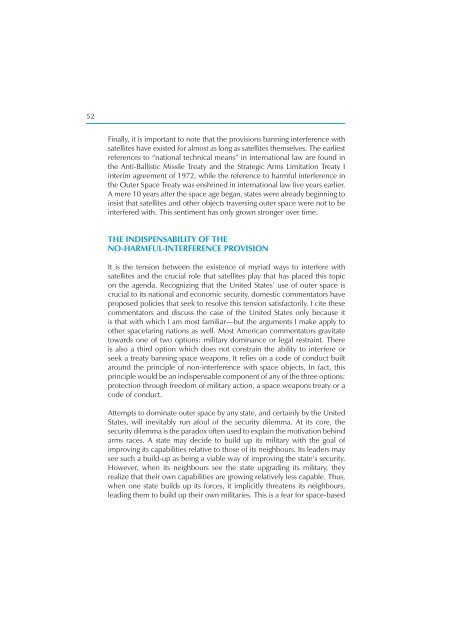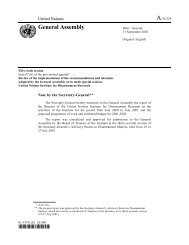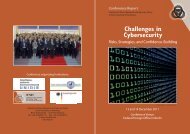Security in Space The Next Generation - UNIDIR
Security in Space The Next Generation - UNIDIR
Security in Space The Next Generation - UNIDIR
Create successful ePaper yourself
Turn your PDF publications into a flip-book with our unique Google optimized e-Paper software.
52<br />
F<strong>in</strong>ally, it is important to note that the provisions bann<strong>in</strong>g <strong>in</strong>terference with<br />
satellites have existed for almost as long as satellites themselves. <strong>The</strong> earliest<br />
references to “national technical means” <strong>in</strong> <strong>in</strong>ternational law are found <strong>in</strong><br />
the Anti-Ballistic Missile Treaty and the Strategic Arms Limitation Treaty I<br />
<strong>in</strong>terim agreement of 1972, while the reference to harmful <strong>in</strong>terference <strong>in</strong><br />
the Outer <strong>Space</strong> Treaty was enshr<strong>in</strong>ed <strong>in</strong> <strong>in</strong>ternational law fi ve years earlier.<br />
A mere 10 years after the space age began, states were already beg<strong>in</strong>n<strong>in</strong>g to<br />
<strong>in</strong>sist that satellites and other objects travers<strong>in</strong>g outer space were not to be<br />
<strong>in</strong>terfered with. This sentiment has only grown stronger over time.<br />
THE INDISPENSABILITY OF THE<br />
NO-HARMFUL-INTERFERENCE PROVISION<br />
It is the tension between the existence of myriad ways to <strong>in</strong>terfere with<br />
satellites and the crucial role that satellites play that has placed this topic<br />
on the agenda. Recogniz<strong>in</strong>g that the United States’ use of outer space is<br />
crucial to its national and economic security, domestic commentators have<br />
proposed policies that seek to resolve this tension satisfactorily. I cite these<br />
commentators and discuss the case of the United States only because it<br />
is that with which I am most familiar—but the arguments I make apply to<br />
other spacefar<strong>in</strong>g nations as well. Most American commentators gravitate<br />
towards one of two options: military dom<strong>in</strong>ance or legal restra<strong>in</strong>t. <strong>The</strong>re<br />
is also a third option which does not constra<strong>in</strong> the ability to <strong>in</strong>terfere or<br />
seek a treaty bann<strong>in</strong>g space weapons. It relies on a code of conduct built<br />
around the pr<strong>in</strong>ciple of non-<strong>in</strong>terference with space objects. In fact, this<br />
pr<strong>in</strong>ciple would be an <strong>in</strong>dispensable component of any of the three options:<br />
protection through freedom of military action, a space weapons treaty or a<br />
code of conduct.<br />
Attempts to dom<strong>in</strong>ate outer space by any state, and certa<strong>in</strong>ly by the United<br />
States, will <strong>in</strong>evitably run afoul of the security dilemma. At its core, the<br />
security dilemma is the paradox often used to expla<strong>in</strong> the motivation beh<strong>in</strong>d<br />
arms races. A state may decide to build up its military with the goal of<br />
improv<strong>in</strong>g its capabilities relative to those of its neighbours. Its leaders may<br />
see such a build-up as be<strong>in</strong>g a viable way of improv<strong>in</strong>g the state’s security.<br />
However, when its neighbours see the state upgrad<strong>in</strong>g its military, they<br />
realize that their own capabilities are grow<strong>in</strong>g relatively less capable. Thus,<br />
when one state builds up its forces, it implicitly threatens its neighbours,<br />
lead<strong>in</strong>g them to build up their own militaries. This is a fear for space-based








